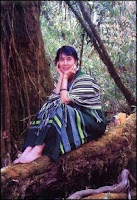Daw Aung San Suu Kyi
 NYT - As a young woman in England, Daw Aung San Suu Kyi carefully avoided becoming involved in the politics of refugee Burmese who inveighed against their military government.
NYT - As a young woman in England, Daw Aung San Suu Kyi carefully avoided becoming involved in the politics of refugee Burmese who inveighed against their military government.
But she forewarned her British fiance that it was inevitable she would return to her homeland some day and the fate that might await her as the daughter of the man who led Burma to independence.
"I only ask one thing, that should my people need me, you would help me to do my duty by them," she wrote.
She did return to Myanmar, formerly Burma, in 1988, although it was to help care for her mother. But as she predicted, she soon became caught up in the country's movement for democracy, emerging within months as the leader and most potent symbol in a revolt against the military rulers.
And just as she had warned, within a year she was put under house arrest, cut off from contact with her husband and two teen-age sons, after she had led her political movement to victory in elections.
In 1991 she was awarded the Nobel Peace Prize, but her confinement has continued, with brief breaks, ever since. She remains the symbol of the hopes of those opposed to the junta, and apparently of the junta's fears as well. When the country's revered Buddhist monks joined protests over rising prices in the fall of 2007, the military allowed them to proceed -- until one of the processions led to her home and she came to her gate to greet them. A brutal crackdown swiftly followed.
After the international outcry over the crackdown, Myanmar's governing officials said they would increase dialogue and consultations with her. On Nov. 8, 2007, she said in a statement released by the United Nations that she was willing to “cooperate” with the military government in the “interest of the nation.”
But the overtures soon stopped and reconciliation between pro-democracy forces and the government stalled.
In May 2009 she was charged with violating the terms of her house arrest after a bizarre event in which an American man was reported to have swum across a lake and spent at least one night on the grounds of her home, where she has been confined for 13 of the past 19 years.
The motives of the man, identified as John Yettaw, 53, were unclear. But her lawyer said the man told her he was a Mormon and prayed extensively while he was in her house. Her arrest came two weeks before the statutory expiration of her most recent six-year detention and many analysts saw it as a legal ploy to allow the junta to extend her confinement.
The junta is preparing for an election in 2010 that would be its first multiparty poll since 1990, when her party won an overwhelming victory but was denied power by the military, which has ruled since 1962.






